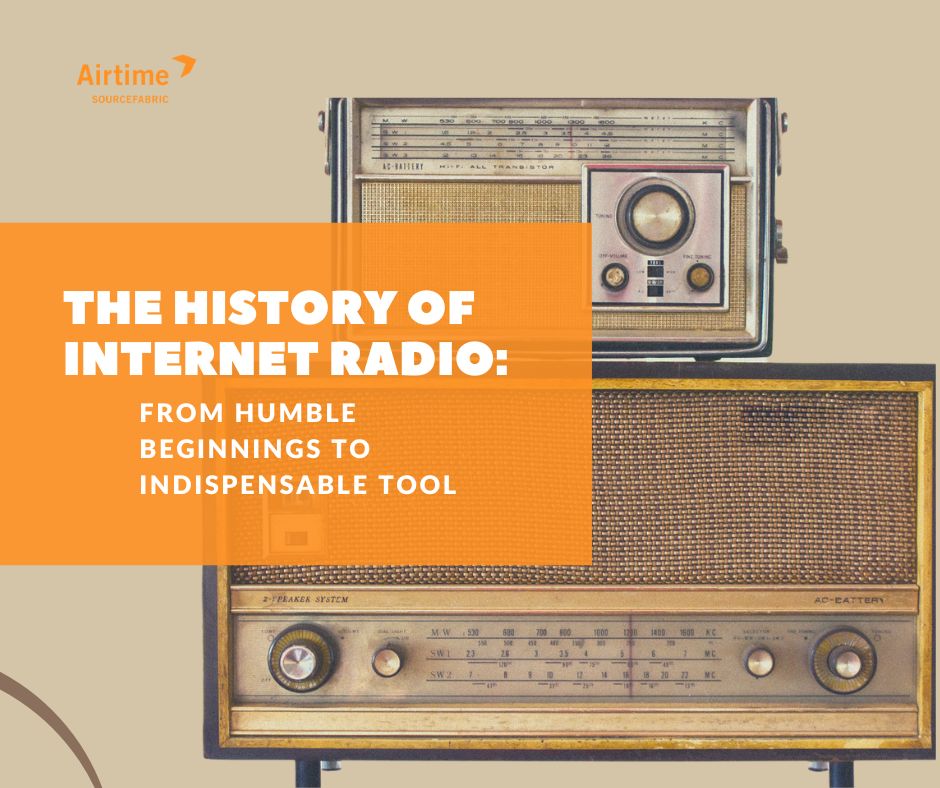The history of Internet radio is a tale of innovation and perseverance. From its early beginnings in the 1990s, Internet radio has grown into a ubiquitous presence in our lives, offering us access to an ever-expanding variety of audio content. From music and talk shows to podcasts and live broadcasts, online radio has become an indispensable tool for the delivery of information and entertainment.
I still recall my first experience with Internet radio in the early 2000s. It was an eye-opening moment, as I was able to listen to music that I couldn’t find on any local FM stations at home. Back then, I was only into electronic – and especially Techno and industrial – music, which was impossible to find on the dial in Greece. When I discovered several cool stations in Germany and Britain that were broadcasting the music I loved, it sparked my interest in the medium and eventually led me to join a local Athenian independent internet radio station, “Trip Radio.”
At the time I was working as an FM radio music programmer, which helped me appreciate the freedom that an internet radio station afforded its DJs. While traditional independent radio stations faced massive resource constraints, internet radio offered a world of possibilities, at a fraction of the cost.
The history of internet radio
Although my personal experience dates back to the early aughts, the first online radio stations emerged a decade earlier, in the early 1990’s. These stations and radio hosts were pioneers in this new world and paved the way for the development of internet radio as we know it today.
While early stations were bogged down by slow internet speeds, the explosion of broadband internet in the 2000s made it possible to stream high-quality audio content. This, in turn, led to the emergence of new online radio stations that offered an ever-increasing range of music content and style.
Today, internet radio is accessible from anywhere in the world. While terrestrial radio still has a sizable following in the United States, online audio and podcasting have seen increased popularity in recent years. Anyone can enjoy thousands of internet stations from their smartphones and laptops to smart speakers and home entertainment systems. With a simple internet connection, we can listen to our favorite radio station, whether it’s across the street or on the other side of the planet.
Which was the first internet radio station ever broadcast?
The first internet radio station is widely considered to be “Radio HK,” which started broadcasting in 1993. It was run by a computer engineer, Carl Malamud, who saw the potential for using the internet as a broadcast medium. At the time, very few people had access to the internet, and the concept of streaming audio over the web was novel. Radio HK broadcasted a mix of music, news, and other content and was accessible through a basic web browser. Although Radio HK was short-lived, it helped to demonstrate the potential of the internet as a broadcast medium and paved the way for the growth of internet radio.
What other problems did early internet radio adopters face?
Because few people had access to the internet, and broadcast technology was new and complex, on-air technical problems and disruptions were frequent. Starting an internet radio station was also costly, and many early stations struggled to secure the funding they needed to stay on the air.
Despite these challenges, early internet radio stations persisted, and their legacy continues to influence the development of the medium today. Now, anyone can start an online radio station from the comfort of their home with just a laptop, a microphone, and internet radio software like Airtime Pro, paying less than $20 a month.
If you want to know how, check out our guide on starting an internet radio from home.
Despite the myriad challenges, early internet radio stations helped to pave the way for the growth of the medium, and their legacy continues to influence the development of internet radio today.
Who are some of the key radio DJs in internet radio history?
Some of the legendary radio DJs and hosts include Diplo, Zane Lowe, Nick Grimshaw, and Annie Mac. These DJs and music personalities have built large followings through their work on traditional and internet radio, and continue to shape the medium.
Trends in the internet radio
One of the most significant trends in internet radio is the rise of podcasts. Here’s another handy guide to podcasting with Airtime Pro.
Another trend is the rise of smart speakers. These devices, such as the Amazon Echo and Google Home, allow you to listen to your favorite radio station simply by voice command, which was like a sci-fi scenario some years ago. That means that you don’t need to connect any other device to listen to your favourite internet station. Thanks to smart speakers, internet radio has become even more accessible and user-friendly.
In conclusion, the history of internet radio is an exciting story of innovation, perseverance, and progress. From its humble beginnings in the 1990s to its current status as an indispensable tool for music, information, and entertainment, internet radio has come a long way. With new trends emerging all the time, there’s no telling what the future holds. But one thing is for sure – it will continue to play an important role in our daily lives for many years to come.


Leave a Reply